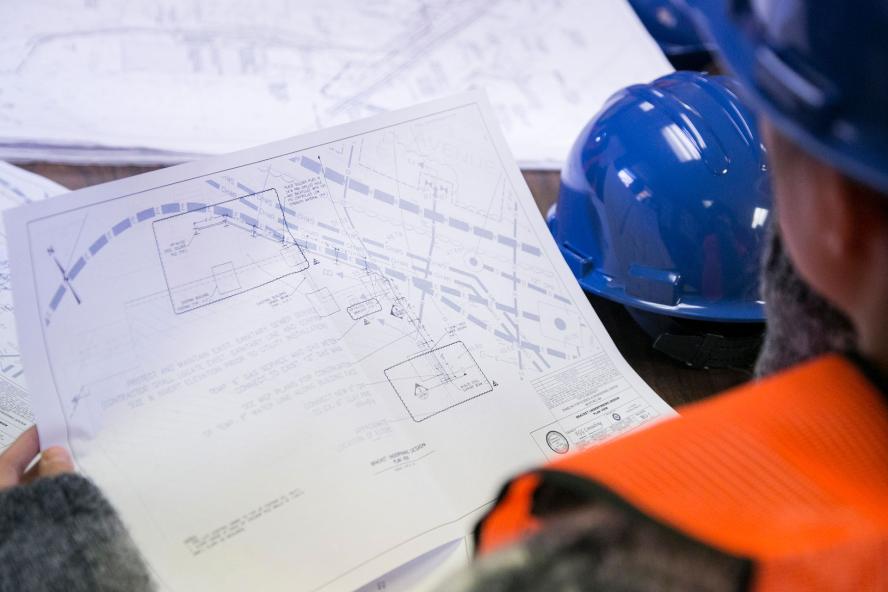Civil and Environmental Engineering
Spring: Sep 15
Summer: n/a
Hybrid
Part-time
Overview
The Civil and Environmental Engineering master's program educates students across and within the fields of environmental health, environmental and water resources engineering, geosystems engineering, and structural engineering and mechanics.
Scholarships Available
Some School of Engineering master's and certificate programs offer scholarships to qualified students. To receive full consideration, be sure to complete your application before the submission deadline. Contact the Office of Graduate Admissions at gradadmissions@tufts.edu for more information.
Program Highlights
We provide students with the best of both worlds: a student-centered experience at a top-notch research university. You'll join small classes and immerse yourself in cutting-edge, interdisciplinary research led by innovative faculty.
Through full and part-time options, students concentrate on areas like civil and environmental systems engineering, environmental health, environmental and water resources engineering, geosystems engineering, and structural engineering and mechanics.
Master's degrees require a minimum of 30 credits and the fulfillment of at least 10 courses at the 100-level or above with grades of S (satisfactory) or at least a B-.
Graduate Cooperative Education (Co-Op) Program
The School of Engineering's Graduate Cooperative Education (Co-Op) Program provides students with the opportunity to apply the theoretical principles they have learned in their coursework to real-world engineering projects. Gain up to six months of full-time work experience, build your resume, and develop a competitive advantage for post-graduation employment. Learn more about the Co-Op Program.
Program Outcomes
Civil and environmental engineers use their training to help society anticipate and respond to the emerging challenges of our changing world by focusing on natural and built systems, and by working at the intersection of infrastructure, the environment, and people.
Students graduate with advanced level expertise in a civil and environmental engineering specialty, some technical breadth in a related specialty, and familiarity with engineering tools used by the profession. Those students who wish to pursue doctoral education and research or a career in engineering practice within the private or public sector can opt to complete thesis research work in addition to the course work required for a master's degree.
Participate in networking opportunities through the weekly CEE Seminar and other annual networking events. Learn to address key societal issues related to how and where we live, work, and interact.
Application Requirements
Admission into the Department of Civil and Environmental Engineering generally requires course credits in science (biology, chemistry, physics), mathematics (through differential equations), and engineering sciences (fluid mechanics, statics).
Students admitted to the Environmental and Water Resources Engineering concentration are expected to have also completed at least one semester of college-level probability and statistics.
Students admitted for the Environmental Health concentration should also possess a suitable background in the biological sciences.
Students lacking one or more of these undergraduate preparations may be admitted on the condition that they complete the necessary coursework during their first year at Tufts. Credits resulting from the successful completion (i.e., a grade of B or better) of conditional coursework are required to obtain a degree but may not be used to satisfy graduate course requirements within the degree program.
- Application Fee
- Resume/CV
- Personal Statement
- Transcripts
- Three letters of recommendation
- Official TOEFL, IELTS, or Duolingo test scores (if applicable)
- GRE General Test scores are not required
- Portfolio (optional)
Tuition & Financial Aid
At Tufts University, we believe every qualified applicant deserves the opportunity to pursue graduate study. We are dedicated to helping you understand your financial options and to ensuring that graduate education at Tufts is both accessible and within reach.
Tuition costs for this graduate program are billed at a per credit rate:
| Estimated Tuition for MS Program | |
|---|---|
| Tuition* | $1,799 per credit |
| Total Credits Required | 30 |
| Enrollment Status | Full-Time: 3-4 courses per semester (9-12 credits) Part-Time: 1-2 courses per semester (3-6 credits) |
| Estimated Tuition per Semester | Full-Time: $16,191 - $21,588 per semester (9-12 credits) Part-Time: $5,397 - $10,794 per semester (3-6 credits) |
| Estimated Total Tuition* | $53,970 |
*Estimated based on 2025-2026 tuition rates. Rates are subject to change each academic year. For further information about the full cost of attendance, including additional fees and estimated indirect costs (housing, transportation, etc.), please visit Student Financial Services.
The Tufts University School of Engineering offers partial, merit-based tuition scholarships for the majority of our graduate and certificate programs. All applicants are automatically considered for these awards as part of our holistic admissions review process—no separate scholarship application or additional materials are required.
Additional funding opportunities may include Tufts Double Jumbo Scholarships for Tufts graduates, Bridge Program Scholarships for students and alumni from select partner institutions, and veteran and military education benefits for eligible service members and their dependents, including participation in the Yellow Ribbon Program.
To further support your investment in a Tufts graduate education, a range of financing options are available, including federal and private student loans. For more details, please visit our Graduate Financial Aid page.
Career Outcomes

Average Salary: $95K+
Projected Job Growth (2022-2032): 5%
*Sources: Average salary and projected job growth statistics are from the U.S. Bureau of Labor Statistics Occupational Outlook Handbook.
Faculty

Laurie Gaskins Baise

Laurie Gaskins Baise
Research/Areas of Interest: geotechnical earthquake engineering, seismic hazard mapping, natural hazards

C. Andrew Ramsburg

C. Andrew Ramsburg
Research/Areas of Interest: multiphase flow and transport in porous media, liquid-liquid and solid-liquid equilibria, sols and emulsions, surfactants and interfaces, mass transfer, biotransformation, emerging contaminants

Brian Brenner

Brian Brenner
Research/Areas of Interest: structural engineering, concrete design, bridge analysis and design, structural analysis/design

Wayne Chudyk

Wayne Chudyk
Research/Areas of Interest: drinking water quality and toxic materials, groundwater monitoring

Luis Dorfmann

Luis Dorfmann
Research/Areas of Interest: Mathematical models of material behavior; Nonlinear magneto- and electromechanical interactions; Biomechanics of soft materials; Rubber elasticity and inelasticity

John Durant

John Durant
Research/Areas of Interest: Air pollution monitoring, mobile monitoring, air pollution modeling, ambient air quality, indoor air quality, air pollution control, air pollution exposure, air pollution epidemiology

John Germaine

John Germaine
Research/Areas of Interest: geotechnical, laboratory testing, automation, soil behavior, physical properties, mechanical properties, material science

David Gute

David Gute
Research/Areas of Interest: environmental and occupational epidemiology, environmental health and safety

Eric Hines

Eric Hines
Research/Areas of Interest: Offshore Wind Energy Structural Design Earthquake Engineering

Neelakshi Hudda

Neelakshi Hudda
Research/Areas of Interest: urban air population, transportation emissions

Shafiqul Islam

Shafiqul Islam
Research/Areas of Interest: Water Diplomacy, Principled Pragmatism, Data Driven Decision Making, Climate and Health, Remote Sensing, Flood Forecasting

Daniel Kuchma

Daniel Kuchma
Research/Areas of Interest: design, behavior, and modeling of concrete structures

Jonathan Lamontagne

Jonathan Lamontagne
Research/Areas of Interest: • Hydrologic Extremes • Water Resources in a Changing World • Energy Systems Modeling • Robust Adaptive Planning

James Limbrunner

James Limbrunner
Research/Areas of Interest: hydrology, water resources systems, IWRM

Babak Moaveni

Babak Moaveni
Research/Areas of Interest: Probabilistic system identification of structures, signal processing, Bayesian inference, model updating, structural dynamics, earthquake engineering, uncertainty quantification, verification and validation of computational models.

Greses Pérez

Greses Pérez
Research/Areas of Interest: cognition and learning sciences, science education, engineering education, diversity and identity, technology and education, language and cognition, multicompetence

Masoud Sanayei

Masoud Sanayei
Research/Areas of Interest: Bridge structural health monitoring, building train-induced vibrations, nondestructive testing of full-scale structures, fatigue life prediction of structures with nonproportional multi-axial loading.

Lauryn Spearing

Lauryn Spearing
Research/Areas of Interest: 1) Infrastructure management during uncertain contexts 2) Understanding public perceptions towards the built environment 3) Sustainable water technology adoption

Helen Suh

Helen Suh
Research/Areas of Interest: Environmental health, environmental epidemiology, air pollution, exposure science, data analytics

Deborah Sunter

Deborah Sunter
Research/Areas of Interest: Science focused on energy, development and environmental management. Computational modeling of electrical grid integration of renewable energy and storage. Interaction of science and policy in academia, industry and government

Chris Swan

Chris Swan
Research/Areas of Interest: Research focuses on sustainable development and innovative engineering education, at times combining the two. Specific research projects include: 1) service-based education and how it can be best assessed and utilized in engineering and 2) waste minimization and reuse of traditional waste materials.

Farshid Vahedifard

Farshid Vahedifard
Research/Areas of Interest: - Resilient and equitable infrastructure - Impacts of extreme events (e.g., drought, flood, wildfire) in a changing climate on infrastructure and communities - Climate adaptation of infrastructure - Slopes, dams, and levees - Unsaturated soil mechanics - Multi-physics (e.g., hydro-mechanical, thermo-hydro-mechanical) processes in soils - Analytical and numerical methods in geotechnical engineering

Robert Viesca

Robert Viesca
Research/Areas of Interest: applied mathematics and mechanics for geophysical and engineering problems

Mark Woodin

Mark Woodin
Research/Areas of Interest: epidemiologic methods